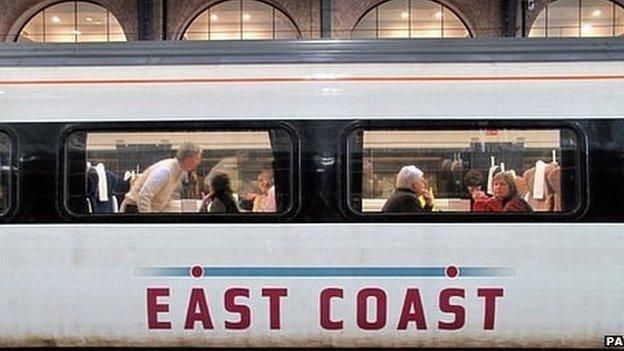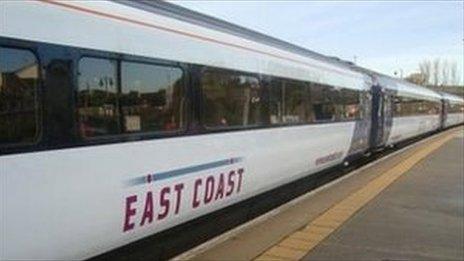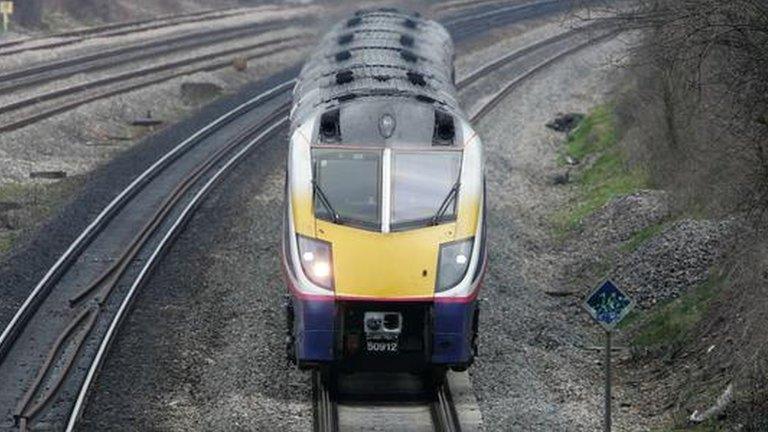Labour plan to part renationalise rail network
- Published
Labour wants to allow parts of Britain's rail network to be run by public or not-for-profit companies
Labour will soon unveil a promise to change the law to allow for the part renationalisation of the rail network.
Public and not-for-profit companies would be allowed to run train services as well as private firms.
I understand that Ed Miliband and the rail unions have reached an agreement on this.
It comes as party leaders fight off calls for full-scale renationalisation of the railways at this weekend's Labour policy conference.
The new law would allow the creation of a state-owned train company to compete against Virgin, Stagecoach and other private companies to run services in different parts of the country.
At the moment the East Coast Main Line is run by a public company which was established when the private firm running it said it could no longer deliver the service.
Compromise motion
However, the coalition government is committed to getting a private firm to take it over later this year.
Labour say that it is bizarre that state-run railways in other countries can bid to run this and other services, but not a British equivalent.

The party is also facing pressure from rail companies who have warned that this move could deter them from bidding and investing in the railways as it would increase the costs of them competing to run rail franchises.
I understand that the rail unions (Aslef, TSSA and Unite, but not the RMT who are not affiliated to the Labour Party) have had meetings with Ed Miliband and his advisers ahead of this weekend's National Policy Forum which will agree what's being described as "the foundation of our manifesto".
A compromise motion has been drawn up which also calls for new national and regional bodies to run and control the railways and to give passengers a legal right to the cheapest tickets and annual caps on fare rises.
In the run-up to this weekend's conference, Labour's policy chief Jon Cruddas has written: "Simply accepting the status quo is not an option for Labour. But nor is a throw-back to the days of British Rail. Public ownership did not solve the problem of chronic under-investment in the railways or the lack of long-term planning.
"This means answers to how we plan future rail investment when there is less money around. How we drive value for money and innovation. How we get Network Rail to come together with operators to create a system that works better for travellers and commuters."
PS
Here is the final wording of the motion to go to Labour's Policy Forum which will be held Friday and Saturday:
"Since the late 1990s there has been significant investment in the railways and passenger numbers have grown sharply. But it is now clear that the rail system is not delivering a fair deal for passengers or the taxpayer, almost 20 years on from the botched privatisation of the railways. Both public subsidy and fares are higher than in other countries, and there is no 'guiding mind' overseeing the railways, planning investment and ensuring results. We have also seen a chaotic franchising process in recent years that has cost millions. To tackle these problems the next Labour government will:
"Review this government's failed franchising process as a priority, after the chaos of recent years, to safeguard taxpayer and passenger interests and put in place a system that is fit for purpose.
"Learn the lessons of East Coast, where we have seen the benefits of a not-for-dividend operator running rail lines, by legislating to allow a public sector operator to be able take on lines and challenge the train operators on a genuinely level playing field to secure value for money for passengers and taxpayers.
"Devolve decisions over the running of regional and local services, including to Scotland and Wales, so that areas can bring together trains, buses, ferries and trams into a single network.
"Tackle the monopoly market for rail rolling stock by giving Network Rail greater responsibility for developing a long term plan for procurement and leasing of new rolling stock.
"Create a new guiding mind for the railways, bringing Network Rail together with a new passenger rail body to contract routes, co-ordinate services, oversee stations and ensure customer satisfaction across the network.
"Ease the pressure on fare payers with the efficiencies these reforms release and by capping annual fare rises on every route, simplifying fare structures and creating a new legal right to the cheapest ticket."
- Published11 July 2014

- Published26 March 2013

- Published11 July 2013
